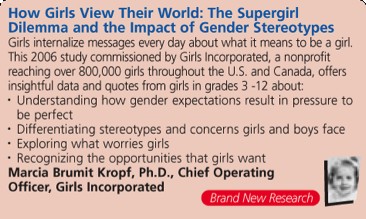Children, who may have begun to realise that advertisements are trying to persuade them to buy the product, are nevertheless easy prey to the manipulations of advertisers because of the pressure they feel “to conform to group standards and mores” in order to belong.
Advertising manipulates them through their insecurities, seeking to define normality for them and shaping the identity they are beginning to form: “marketers  have closely studied the adolescent process of identity formation, tailoring their strategies to the key emotional and behavioral experiences that are part of these important explorations of self”.
have closely studied the adolescent process of identity formation, tailoring their strategies to the key emotional and behavioral experiences that are part of these important explorations of self”.
Marketers promote identities based on branded “lifestyles”. They hijack real emotions and attach them to trivial products thereby trivialising those emotions and encouraging children to form emotional attachments with products rather than people. Marketers set out to make cool the sole determinant of social success among young people. Advertisements promise that by purchasing their products children will be popular, successful and/or attractive.
Consultant Nancy Shalek stated: “Advertising at its best is making people feel that without their products, you’re a loser. Kids are very sensitive to that. If you tell them to buy something, they are resistant. But if you tell them they’ll be a dork if they don’t, you’ve got their attention. You open up emotional vulnerabilities, and it’s easy to do with kids because they’re the most vulnerable”.

 The emphasis of advertising on creating anxieties and insecurities has resulted in a generation that is insecure, lonely, frustrated and depressed. “Bombarded with images of how they should look and what they should own, children struggle to keep up, suffering from stress; anxiety; increasingly lower satisfaction with themselves and their lives.”
The emphasis of advertising on creating anxieties and insecurities has resulted in a generation that is insecure, lonely, frustrated and depressed. “Bombarded with images of how they should look and what they should own, children struggle to keep up, suffering from stress; anxiety; increasingly lower satisfaction with themselves and their lives.”
For example advertisers prefer to use long-legged, thin yet buxom, clear-complexioned, beautiful female models and this produces “feelings of inadequacy and discomfort” amongst girls. The National Consumer Council (NCC) revealed that for adolescent girls in the UK, their dissatisfaction with their body shape was correlated with how much they read fashion magazines and another correlated it to viewing television advertisements.
In Australia a survey of girls by reseearchers at Flinders University found that 47% of five to eight year olds (and 71% of the seven year olds) wanted to be thinner. The researchers pointed out that "awareness of body image was originally thought to develop around adolescence but its getting younger and younger". Body shape insecurity can lead to low self-esteem, depression and eating disorders.
In the world promoted by advertisers where every dissatisfaction can be fixed through purchase, it is no surprise that the instances of teenagers accessing plastic surgery are rapidly increasing, particularly given the bombardment of pro-plastic surgery stories in magazines and on television shows.
Boys are not immune either. Many teenage boys are now buying powdered drinks, nutritional supplements and even steroids to achieve the muscular bodies featured on toy action figures, in cartoon characters, and in advertisements.
In the US:
In Australia: